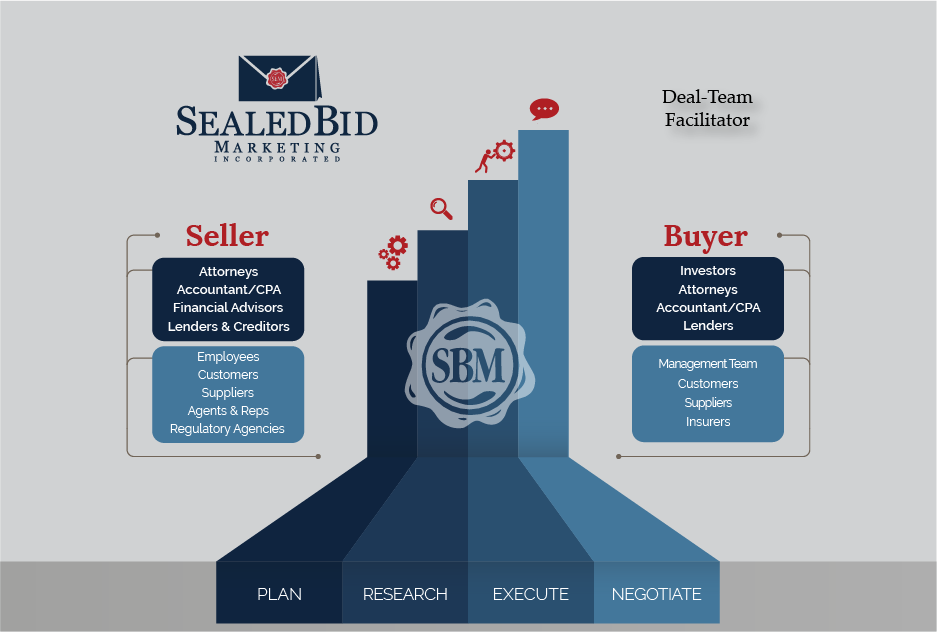Selling (or buying) a business is a full-time job! SealedBid has provided Merger and Acquisition (”M&A”) guidance for over 25 years and has extensive experience maximizing value for our clients. As a facilitator and intermediary, we work closely with clients, management teams and advisors from pre-engagement to engagement and from engagement to closing. But this spotlight is not just about SealedBid, it is about the importance of having a team with strong M&A experience – – attorneys, certified public accountants (“CPAs”), wealth managers and bankers all play key roles in putting together a successful deal.

Creating a Deal Team
In the lower mid-market, companies rarely have in-house professionals with M&A expertise (unlike many larger businesses) and must rely on outside advisors when building their “Deal Team.” In most cases, an owner or ownership group has worked with numerous attorneys, CPAs, bankers and other advisors throughout the course of starting, growing and operating their business. However, not all professionals have experience or the expertise to properly assist in an M&A transaction. Selecting and creating a Deal Team begins in the planning stages of Succession Planning with ownership interviewing and selecting experienced advisors. In advance of a transaction, the Deal Team will assist ownership in positioning the Company to maximize tax benefit, meet estate planning needs, limit post-transaction exposure and more. Coordination of the Deal Team and strategic planning pays dividends as Ownership initiates the Exit Plan resulting in maximizing enterprise value!
Role of an Attorney in a Transaction
Having an attorney that is “transaction-savvy” is extremely helpful when completing a transaction and is equally as important for the sell-side or buy-side of the deal. In the lower mid-market, M&A attorneys bring an understanding of today’s marketplace and access to legal expertise across multiple disciplines (e.g. documentation, tax, real estate, employment, benefits, representations & warranties, etc.) to assist in negotiating a fair transaction.
Listed below are some examples of specific tasks that M&A attorneys take ownership of in a transaction:
- Reviewing and offering input as to the Letter of Intent
- Conducting legal due diligence (typically with coordination assistance from the Intermediary and amassing information)
- Reviewing and advising on all third-party (customer, supplier, etc.) relationships and agreements to ensure a smooth transition of the operation
- Drafting, reviewing and negotiating purchase agreements
- Drafting, reviewing and negotiating secondary documents including real estate leases, employment agreements, non-compete agreements, bill of sale, escrow agreement, etc.
- Once a transaction is in motion, a seasoned transaction attorney provides great value in helping to drive the deal forward to a successful closing.
Role of a CPA in a Transaction
A strong CPA with M&A experience is an important asset to the Deal Team. In the planning stages of a transaction, CPAs play an important role in providing, among other analysis, detailed models for tax and estate planning (in coordination with wealth manager on sell-side) as well as feasibility and return-on-investment planning (buy-side). The CPA helps ownership understand what they own, what they owe and what will be included in the transaction (material assets and liabilities).
Below are a sample of specific tasks that CPAs oversee in an M&A transaction:
- Lead the financial due diligence (typically with coordination assistance from the Intermediary)
- Prepare, review and present financial reports and transaction models during the due diligence process
- Verify the accuracy of business reports and the Company’s overall reporting methods
- Organize, document and verify the business’s tax filings, in addition to giving a sense of the other party’s tax status
- Negotiate working capital and purchase price allocation calculations specific to the transaction
- The CPA’s role continues in transition post-transaction verifying all financial detail during the true-up period as well as assisting in earn-out calculations (if applicable) and post-closing debt structures.
Role of a Banker in a Transaction
In the simplest terms, the main role of an M&A banker is to assist their client in finding money that is needed to complete a merger or acquisition. Recently, banks and non-traditional lending sources have become ever more aggressive in the lower mid-market and there are many options to structure financing tailored to each transaction (e.g. SBA loans, senior debt, mezzanine debt, unitranche financing, etc.).
Working with an experienced business banker allows individuals or companies completing a transaction to have access to a tailored financing approach. Tailored financing tends to result in a smooth closing process and can add tremendous value by positioning the Company for success post-closing!
SealedBid’s Role in a Transaction
An intermediary is the hub of the deal, whereby coordination, facilitation and striving for client success is the ultimate goal. As a trusted advisor and intermediary, SealedBid is proud to have successfully served clients for over 25 years with M&A Advisory, Recapitalizations, Succession/Exit Planning, Family Transfers and Management/Partner Buy-outs. SealedBid works as a central point of the sell-side (or buy-side) Deal Team from the planning stages to the closing – while managing/coordinating all the phases in between.
Having built relationships while working closely with attorneys, CPAs, bankers and other transaction professionals on many successful transactions in the Upper Midwest and throughout the country, SealedBid truly understands the importance of the Deal Team.

If you are interested in learning more about SealedBid, our services or our team, please do not hesitate to contact us at (952) 893-0232. SealedBid will work closely with you, your financial advisor, attorney, accountant and banker from the initial stages of pre-marketing through closing and post-closing.

